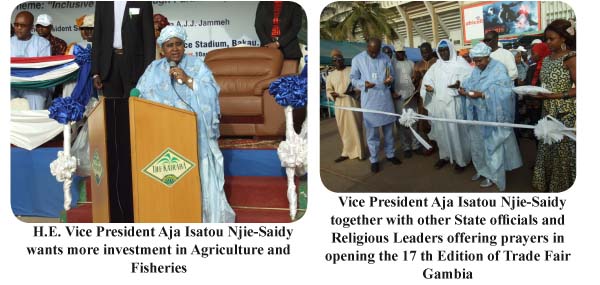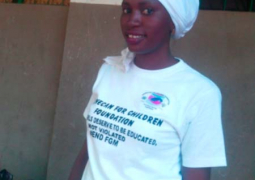
Vice President Aja Isatou Njie-Saidy has called on members of the private sector to invest more in Agriculture and Fisheries in the Gambia’s goal of Vision 2020.
The vice president made this passionate call on economic operators in the country on 1 March 2014 at the 17th edition of the Trade Fair Gambia organised by the Chamber of Commerce and Industry (GCCI) at the Independence Stadium in Bakau.
While emphasizing that Trade Fair Gambia will go a long way in helping in the country’s poverty reduction strategies by creating a wealth of experience, Vice President Njie-Saidy stated:“Against this backdrop, I use this opportunity to renew my call on the private sector to invest more in Agriculture and Fisheries, processing preservation, transformation and value addition given that we have barely 6 years to the Finish Line of Vision 2020.”
This, she notes, will also respond to President Yahya Jammeh’s call on Gambians to “eat what you grow and grow what you eat”.
Although, according to the 2014 national budget, the country has been making some good improvement in investing in agriculture and fisheries, the vice president states that more investment is needed to ensure food self-sufficiency.
According to the national budget, recent times have seen the intensification of investment in this sector evidenced by the scaling up of the agriculture resource envelope from less than 3 per cent of government revenue in 2011 to its current level of about 8 per cent.
“2013/2014 also witnessed the launching of Two Major Developments projects, namely FASDEP (Food Agricultural Security Development Project) and Agricultural Land and Water Management Project (NEMA). The total investment for the two projects is about $130 million,” the budget states.
It says further that government’s focus now is to transform agriculture from its current subsistence form of farming to a more commercial based, focusing primarily on value addition.
“To achieve this goal,” the budget states, “Government recognizes that more investment needs to be done on Research, Science and Technology.”
In the area of artisanal fisheries, the budget notes, Government, in collaboration with its development partners, is providing fisheries infrastructure facilities and equipment “throughout the country”.
“The Artisanal Fisheries Development Project (GAFDP) co-funded by the Government of the Gambia (GOTG), The African Development Bank (ADB) and the Arab Bank for Economic Development in Africa (BADEA) is ending in 2013 with the entire project components satisfactorily implemented,” the budget stated.
On this backdrop, a stream of more and fresh investment is needed to boost the two sectors for the attainment of food security and economic growth.
In his remarks on the occasion, Trade Minister Abdou Kolley also called on economic operators, especially Gambian manufacturers, to utilize the ECOWAS Trade Liberalisation Scheme (ETLS) and take advantage of its verse and related opportunities.
He said: “Our strong collaboration and ties with the Gambia Chamber of Commerce and Industry enabled The Gambia to start the implementation of the Inter State Road Transit (ISRT) Scheme in July 2013.
“The objective of the scheme is to facilitate the transportation of transit goods through The Gambia to other countries in the sub-region in order to make the Port of Banjul a hub for transit goods.
“Let me seize this opportunity to commend all the stakeholders for their support and cooperation in ensuring the effective implementation of the scheme.
“My Ministry is also championing the utilization of the ECOWAS Trade Liberalisation Scheme (ETLS) by Gambian manufacturers in order to increase market access.
“Currently, sixteen Gambian companies have been certified to operate under the Scheme but most of these companies are yet to fully utilize the Scheme due to supply side constraints amongst other challenges.
“I hope the private sector through strong partnerships will effectively utilize the ETLS and take advantage of the huge opportunities that the ECOWAS market offers to support our development efforts.
“The Scheme will become even more relevant with the coming into effect of the ECOWAS Common External Tariff in January 2015.”
EndFragmentRead Other Articles In Article (Archive)



